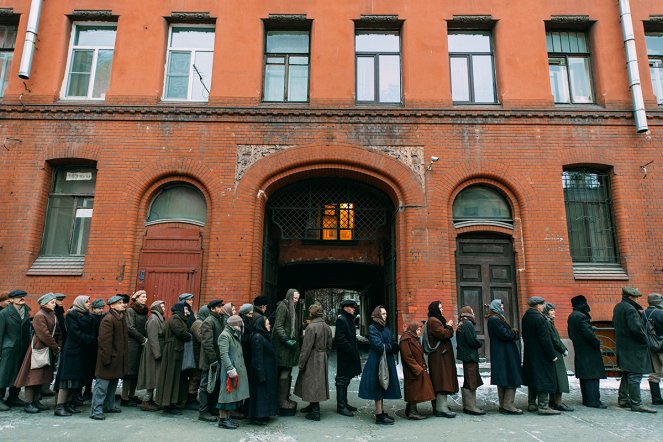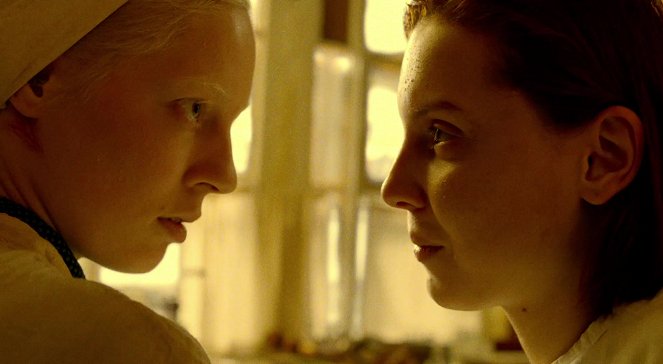Regie:
Kantemir BalagovDrehbuch:
Kantemir BalagovKamera:
Kseniya SeredaMusik:
Evgeniy GalperinBesetzung:
Viktoriya Miroshnichenko, Vasilisa Perelygina, Timofey Glazkov, Igor Shirokov, Ксения Кутепова, Константин Балакирев, Ольга Драгунова (mehr)Streaming (1)
Inhalte(1)
Leningrad 1945: Die faschistische Belagerung ist vorüber, doch der tägliche Überlebenskampf geht weiter. Iya, eine hagere und hochgewachsene junge Frau, hat den kleinen Sohn ihrer Freundin Masha durch den Krieg gebracht. Doch Iya leidet unter Schockstarren, und bei einem Anfall geschieht ein tragisches Unglück. Als Masha in die zerstörte Stadt zurückkehrt und vom Tod ihres Sohnes erfährt, verlangt sie von Iya, das sie ihre Schuld begleicht ... (Eksystent Distribution)
(mehr)Videos (5)
Kritiken (3)
Für einen 28-jährigen Autor ein bewundernswert schwieriges Thema mit komplizierten Beziehungen. Auf der Bildebene wird perfekt sowohl die Atmosphäre des Ortes und der Zeit als auch die Laune der Geschichte und ihrer Figuren dargestellt. Obwohl diese Art von depressiven Dramen, die im alten Russland spielen, überhaupt nicht mein Ding ist, muss ich bei Balagow als Künstler sagen – Chapeau. Was wird er als altgedienter Regisseur drehen? PS: Die Leistungen beider Schauspielerinnen sind brillant. Obwohl die Frage im Raum steht, in wieweit sie es gespielt haben. Am nächsten Tag hob ich, als ich schnell auf der Straße lief, kurz meine Augen vom Handy und für eine Sekunde trafen sich die Blicke von mir und der vorbeigehenden Miroschnitschenko (die Darstellerin der sehr komplizierten Hauptfigur). Es war genau einer der Blicke, die sie auf alle im Film geworfen hat, und in ihm die Reaktion auf ein Geschöpf, welches in ihre Komfortzone eingetreten ist. Mir schauderte regelrecht. [Cannes]
()
This Russian post-war drama about physical and mental wounds and how those wounds can set off another cycle of pain is both a welcome and necessary departure from the bombastic Russian propaganda of war epics. Furthermore, it also stands on its own as a depressing drama with claustrophobically vented emotions. A separate chapter presents the precise, masterful craftsmanship, from the dramaturgy of the colour palette and interiors through the excellent camera work to outstanding acting performances. The consistently implemented form can to some extent draw attention away from the core of the film, which is the weight of guilt and the futile attachment to a vision of happiness.
()
The setting in post-war Leningrad is merely a backdrop, as the story of Beanpole is actually universal, and given that the film almost exclusively tells it through the characters rather than the setting it champions, it's actually a bit misleading. The overuse of long close-ups of characters staring at each other, looking for answers or at least relief in each other's eyes, can ultimately degrade the power of this mode of expression because, as young sensitive directors will hopefully learn one day, a facial close-up is a terribly important and powerful type of shot that needs to find its place in a space and time that often no one has built here. It goes from a close-up in one space to a close-up in another space. While the cinematography and color work are occasionally impressive in the way they forgo the proffered grayness of the post-war big city and splash pastel colors in the promise of a gradual return to better times in the illustrations of Russian storybooks, it's ultimately useless when the film for all practical purposes forgets to work with that setup in the end. It's a shame Alexei German didn't get to make something from this era.
()
Galerie (35)
Photo © Cinetic Media



Werbung